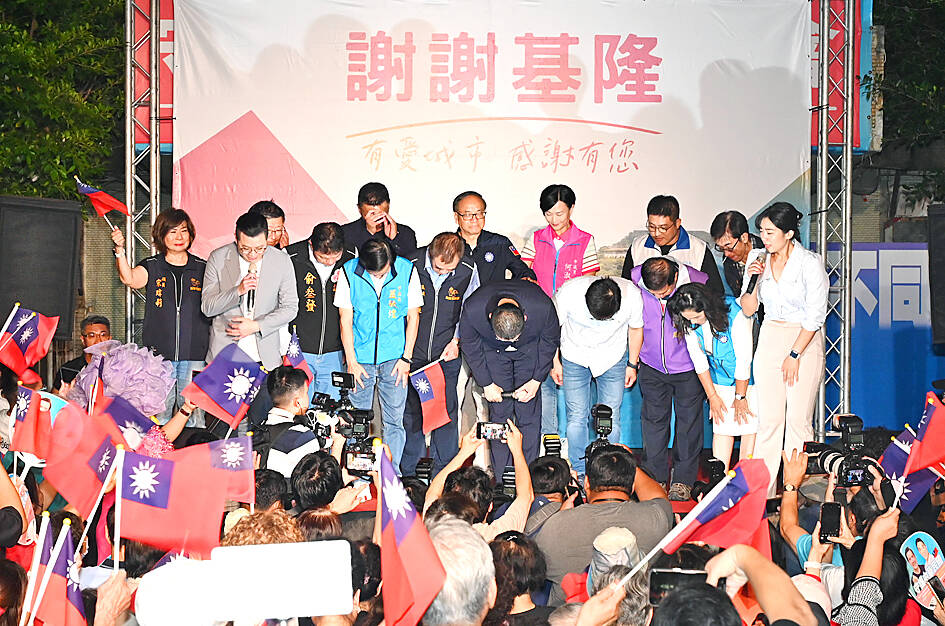Keelung Mayor George Hsieh (謝國樑) of the Chinese Nationalist Party (KMT) would remain in office after a majority of voters yesterday voted against recalling him.
Keelung City Election Commission figures showed that 86,014 people (55.15 percent of valid votes) voted to keep Hsieh in office, while 69,934 (44.85 percent) voted in favor of recalling him.
The number of ballots cast in favor of Hsieh’s recall did not meet the required 25 percent threshold of 77,700 ballots.

Photo: Wang Yi-sung, Taipei Times
Under the Civil Servants Election and Recall Act (公職人員選舉罷免法), Hsieh cannot face another recall vote for the remainder of his term in office.
The results showed a voter turnout of 50.44 percent of 310,797 eligible voters. The final results are pending certification by the Central Election Commission.
In all seven districts, the number of votes in favor of recalling Hsieh was lower than the number of ballots rejecting the recall.
Campaigners initiated the vote in March due to what they said were unfulfilled election promises by Hsieh and a dispute over a change in the operator of the Keelung E-Square Mall (基隆東岸商場).
Hsieh, 49, has received significant support from high-ranking KMT members, with former president Ma Ying-jeou (馬英九), KMT Chairman Eric Chu (朱立倫) and Taipei Mayor Chiang Wan-an (蔣萬安) appearing with Hsieh at rallies in the run-up to the recall vote.
Hsieh, who was a legislator from 2005 to 2016, assumed office as mayor on Dec. 25, 2022.
The recall vote was the first of a leader of a city or county since then-Kaohsiung mayor Han Kuo-yu (韓國瑜) lost a recall vote in 2020.

The disruption of 941 flights in and out of Taiwan due to China’s large-scale military exercises was no accident, but rather the result of a “quasi-blockade” used to simulate creating the air and sea routes needed for an amphibious landing, a military expert said. The disruptions occurred on Tuesday and lasted about 10 hours as China conducted live-fire drills in the Taiwan Strait. The Civil Aviation Administration (CAA) said the exercises affected 857 international flights and 84 domestic flights, affecting more than 100,000 travelers. Su Tzu-yun (蘇紫雲), a research fellow at the government-sponsored Institute for National Defense and Security Research, said the air

Taiwan is to commence mass production of the Tien Kung (天弓, “Sky Bow”) III, IV and V missiles by the second quarter of this year if the legislature approves the government’s NT$1.25 trillion (US$39.78 billion) special defense budget, an official said yesterday. Commenting on condition of anonymity, a defense official with knowledge of the matter said that the advanced systems are expected to provide crucial capabilities against ballistic and cruise missiles for the proposed “T-Dome,” an advanced, multi-layered air defense network. The Tien Kung III is an air defense missile with a maximum interception altitude of 35km. The Tien Kung IV and V

Trips for more than 100,000 international and domestic air travelers could be disrupted as China launches a military exercise around Taiwan today, Taiwan’s Civil Aviation Administration (CAA) said yesterday. The exercise could affect nearly 900 flights scheduled to enter the Taipei Flight Information Region (FIR) during the exercise window, it added. A notice issued by the Chinese Civil Aviation Administration showed there would be seven temporary zones around the Taiwan Strait which would be used for live-fire exercises, lasting from 8am to 6pm today. All aircraft are prohibited from entering during exercise, it says. Taipei FIR has 14 international air routes and

Taiwan lacks effective and cost-efficient armaments to intercept rockets, making the planned “T-Dome” interception system necessary, two experts said on Tuesday. The concerns were raised after China’s military fired two waves of rockets during live-fire drills around Taiwan on Tuesday, part of two-day exercises code-named “Justice Mission 2025.” The first wave involved 17 rockets launched at 9am from Pingtan in China’s Fujian Province, according to Lieutenant General Hsieh Jih-sheng (謝日升) of the Office of the Deputy Chief of the General Staff for Intelligence at the Ministry of National Defense. Those rockets landed 70 nautical miles (129.6km) northeast of Keelung without flying over Taiwan,